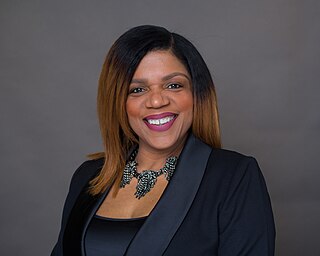Related Research Articles

The Presidential Advisory Council on HIV/AIDS (PACHA) advises the White House and the Secretary of Health and Human Services on the US government's response to the AIDS epidemic. The commission was formed by President Bill Clinton in 1995 and each president since has renewed the council's charter.

Mary Lou Clements-Mann was the founder and first Director of the Center for Immunization Research at the Johns Hopkins Bloomberg School of Public Health and is well known for her work in the areas of HIV and influenza vaccine research.
Claire Elizabeth Sterk is a Dutch scientist and Charles Howard Candler Professor of Public Health at Emory University. Sterk held faculty positions in anthropology,sociology,and women's,gender,and sexuality studies at Emory. From 2016 to 2020 she served as president of Emory University.
Marie Diener-West is the Helen Abbey and Margaret Merrell Professor of Biostatistics and the chair of the Master of Public Health Program at Johns Hopkins Bloomberg School of Public Health. Diener-West is an editor for the Cochrane Eyes and Vision Group and a member of the American Public Health Association,American Statistical Association,Association for Research in Vision and Ophthalmology,and the Society for Clinical Studies.

Thomas J. Coates is the Director of the multi-campus University of California Global Health Institute,a UC-wide initiative established to improve health and reduce the burden of disease throughout the world. He is Professor Emeritus at the UCLA David Geffen School of Medicine and Founding Director of the UCLA Center for World Health,a joint initiative of the David Geffen School of Medicine at UCLA and UCLA Health,He has conducted extensive research in the realm of HIV and is the Michael and Sue Steinberg Endowed Professor of Global AIDS Research within the Division of Infectious Diseases at UCLA and Distinguished Professor of Medicine. Health-related behavior is of particular interest to Coates. Throughout his career as a health expert,his theory-based research has been focused on interventions aimed at reducing risks and threats to health
Cissy Kityo Mutuluuza,is a Ugandan physician,epidemiologist and medical researcher. She is the Executive Director of the Joint Clinical Research Centre,a government-owned medical research institution in Uganda,specializing in HIV/AIDS treatment and management.

Céline R. Gounder is an American physician and medical journalist who specializes in infectious diseases and global health. She was a member of the COVID-19 Advisory Board transition team of then-incoming U.S. president Joe Biden. In 2022,she joined the Kaiser Family Foundation as senior fellow and editor-at-large for public health at Kaiser Health News.

Camara Phyllis Jones is an American physician,epidemiologist,and anti-racism activist who specializes in the effects of racism and social inequalities on health. She is known for her work in defining institutional racism,personally mediated racism,and internalized racism in the context of modern U.S. race relations. During the COVID-19 pandemic,Jones drew attention to why racism and not race is a risk factor and called for actions to address structural racism.
Gypsyamber D'Souza is an American epidemiologist. She is a professor of epidemiology at the Johns Hopkins Bloomberg School of Public Health. D'Souza researches infectious diseases,cancer prevention,and translational epidemiology. She is a principal investigator of the Multicenter AIDS Cohort Study / Women's Interagency HIV Study Combined Cohort Study (Mwccs.org).

Nadia Lauren Dowshen is an American pediatrician and adolescent medicine physician. She specializes in the care of youth living with HIV infection and medical care to transgender and gender-diverse youth. Dowshen researches health inequality,access to care,and promoting resilience in LGBT youth. As an associate professor at the Perelman School of Medicine at the University of Pennsylvania,she is also the medical director and co-founder of the Gender and Sexuality Development Clinic.
Crystal C. Watkins Johansson is an American neuroscientist and psychiatrist and associate professor of neuroscience at Johns Hopkins University School of Medicine as well as the director of the Sheppard Pratt Memory Clinic in Neuropsychiatry in Baltimore,Maryland. Johansson was the first Black female Meyerhoff Scholar to obtain an MD/PhD from the University of Maryland,Baltimore County. During her MD/PhD she developed a novel treatment for gastrointestinal in patients with diabetes that led to a patent for a pharmacological compound in 2000. Johansson is a practicing neuropsychiatrist with a focus on geriatric psychiatry and she conducts brain imaging research as well as research on cancer in African American women.
Kelly Anne Gebo is an American epidemiologist and infectious disease specialist. She was the inaugural Vice Provost for Education at Johns Hopkins University and served as the Chief Medical and Scientific Officer for the All of Us Research Program at the National Institutes of Health.
David Wesley Dowdy is an American infectious disease epidemiologist. He is the B. Frank and Kathleen Polk Professor at Johns Hopkins Bloomberg School of Public Health.

C. Debra M. Furr-Holden is a Professor of Epidemiology at New York University’s School of Global Public Health. She served as the school's Dean from July 1,2022,to March 29,2024.

Jessica Fanzo is an American scientist. She is the Bloomberg Distinguished Professor of Global Food and Agriculture Policy and Ethics at the Johns Hopkins Berman Institute of Bioethics,the Bloomberg School of Public Health,and the Paul H. Nitze School of Advanced International Studies. Prior to coming to Johns Hopkins,Fanzo was an assistant professor of Nutrition in the Institute of Human Nutrition and Department of Pediatrics at Columbia University. In January 2023,Columbia announced that Fanzo will rejoin its faculty as a professor in the Columbia Climate School. In 2024,Fanzo was elected a member of the National Academy of Sciences.
Martha Norton Hill is an American nurse. She was the Dean of the Johns Hopkins School of Nursing and Professor of Nursing,Medicine,and Public Health at Johns Hopkins University.
Ronald S. Brookmeyer is an American public health researcher. He is a professor of biostatistics at the UCLA Fielding School of Public Health.

Jennifer Y. Webster-Cyriaque is an American dentist and immunologist specializing in the oral microbiome,salivary gland disease in patients with HIV,and cancer-causing viruses. She became the deputy director of the National Institute of Dental and Craniofacial Research in November 2020. Webster-Cyriaque was a faculty member at UNC Adams School of Dentistry and the UNC School of Medicine for 21 years.
Jean Nachega is a Congolese American physician who is an Associate Professor of Medicine at the University of Pittsburgh. He is an infectious diseases doctor with a focus on improving the public health outcomes of people infected with HIV/AIDS. He is a Fellow of the African Academy of Sciences.
Stephen Gange is an American statistician,epidemiologist,and academic administrator of Johns Hopkins University. He is a professor of epidemiology at the Johns Hopkins Bloomberg School of Public Health and has a joint appointment in the Johns Hopkins School of Medicine.
References
- 1 2 "Tonia Poteat". hptn.org. Retrieved October 27, 2020.
- 1 2 Chang, Justin (January 22, 2007). "For The Bible Tells Me So". variety.com. Variety . Retrieved October 27, 2020.
- ↑ Williams, Divya (August 2, 2020). "Advocating for Health Equity: PA Focuses Work on HIV and LGBT Health". aapa.org. American Academy of Physician Assistants. Retrieved October 27, 2020.
- ↑ "Alumni spotlight: Tonia Poteat, MMSc, MPH, PA-C". med.emory.edu. Retrieved October 27, 2020.
- ↑ "Tonia Poteat, MMSc, PA-C, MPH, PhD". thewellproject.org. 9 October 2014. Retrieved October 27, 2020.
- ↑ Helfand, Myles (March 20, 2019). "Tonia Poteat's Career Started With a Piece of Folded Paper". thebodypro.com. Retrieved October 27, 2020.
- ↑ "2014 Diversity Awards". diversity.jhu.edu. Retrieved October 27, 2020.
- ↑ "Social Medicine Welcomes Tonia Poteat to the Faculty". med.unc.edu. October 25, 2018. Retrieved October 27, 2020.
- ↑ "Tonia Poteat, Ph.D., Assistant Professor, Social Medicine". cpc.unc.edu. Retrieved October 27, 2020.
- ↑ "Multiple forms of stigma may increase risk for mental illness and cardiovascular disease among Black and Latina Transgender Women Living with HIV". news.unchealthcare.org. November 26, 2019. Retrieved October 27, 2020.
- ↑ "Poteat appointed to the National Academies of Science Consensus Panel on the Well-Being of Sexual and Gender Minorities". med.unc.edu. June 14, 2019. Retrieved October 27, 2020.